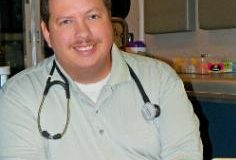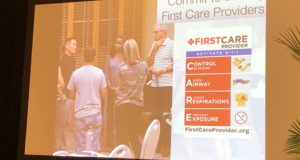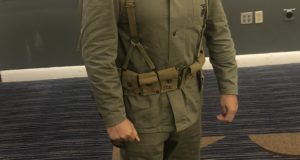You need to call or email your state legislators now, and tell them to vote YES on HB 2020 and SB 1899. These bills will allow Texas EMTs and paramedics to practice their clinical skills in the hospital setting under the direct supervision of a physician. Essentially, they propose to expand the settings in which you can practice as an EMT.
This is an important professional advance, whether you have any interest in working in an Emergency Department or not.
Predictably, the nursing advocacy organizations have already started spreading lies and misinformation in an attempt to protect their turf. If you want to read more about it and see a more thorough fisking of their lies, go check out Unwired Medic’s blog post on the subject.
What follows is a letter from the San Antonio chapter of the Texas Emergency Nurse Association, and it has been endorsed by Texas ENA. This is what nursing advocacy organizations are saying to legislators about you, Texas EMTs and paramedics:
Dear SAENA Member,
The Texas ENA Government Affairs Chair has asked that the following information be sent out to all of Texas ENA members:
House Bill 2020 and Senate Bill 1899 are currently under discussion and maybe moving for vote in the near future.
These bills would change the scope of the EMT-P and licensed paramedic to include the initiation of advanced life support measures such as; IVs, intubation, defibrillation / cardioversion and administration of medications under the supervision of a physician who is present in the same area or an area adjacent to the area. These actions would occur in an emergency or urgent care clinical setting, including a hospital emergency room or a freestanding emergency medical care facility.
The Texas ENA is opposed to the passing of these bills and requests members immediately contact their House and Senate representatives by calling, writing a letter or email, to express opposition to the bills. (To identify your representative, go to http://www.house.state.tx.us/memb…/find-your-representative/ )
The Government Affairs Chair included a letter, written by a member, which identifies the issues related to these bills. Members may use the basic information in the document to compose their own letters to their legislator or to identify points to discuss when speaking to their representative.
I am writing today as a registered voter in opposition to HB2020 relating to the scope of duties of an emergency medical technician-paramedic and a licensed paramedic. This bill allows EMTs and EMT-Paramedics the authority to provide healthcare services including advanced life support in hospital emergency rooms and freestanding emergency medical care facilities under a physician delegation.
As an emergency nurse, I am concerned that this bill will potentially affect the safety and level of care provided to patients in the emergency department and encourage hospitals to utilized less qualified providers for staffing. Currently, EMT and paramedics are provided the authority to provide life saving measures in the pre-hospital environment until the patient can reach the emergency department which is a higher level of care. This role utilizes physician-developed protocols and direct communication with the hospital to direct care until the patient arrives at the emergency department. The focus of the training is on skills. The Texas Board of Nursing rules limits what tasks can be delegated to others. This restricts paramedics from administering medications and intravenous fluids in the hospital setting.
This differs significantly from the registered nurse role which is an autonomous provider who’s training includes independent decision-making in which the RN works collaboratively with the physician to ensure that adequate care is provided to the patient. There is extensive preparation in pathophysiology, pharmacology, skills, and critical thinking/clinical judgment. Current research shows a direct correlation between nursing care and positive patient outcomes. Most emergency departments require that emergency RNs are trained in advanced cardiac life support and trauma nursing care. There is a national certification body that also provides certification in emergency nursing. Furthermore, the Texas Board of Nursing rules does not allow nursing to carry out orders from an EMT or paramedic.
EMTs and EMT-Paramedics temporarily receiving direction for a physician could create a very unsafe situation during the most critical time in the patients hospital stay. Currently they receive directions (delegation) from a nurse so who do they listen to in this critical situation when the nurse needs help and the physician requests their assistance. Who is accountable when they accidentally misunderstand the delegation instructions.
I urge you to vote no on this bill for patient safety reason.’
Attached to this email is a copy of HB 2020 for you to review. In addition, at the end of the email are the names of the committees and links to the specific legislators now discussing these bills. You may contact these legislators even if they are not your district representatives.
I urge you to stand up and be heard! Contact your legislator NOW and tell them to vote NO on HB 2020 an SB 1899.
Carol Twombly
President
San Antonio Chapter
Texas Emergency Nurses Association
We’ll address Carol Twombly’s lies and misconceptions in a bit, but first I’d like to point out that this sort of thing is commonplace around the country. And wherever it happens, you will find EMTs and paramedics bitching impotently about how we are ruled by the nursing profession.
If you don’t take part in the process and refute their claims, then do not complain about other healthcare professions thwarting EMS professional development.
This is your profession. Take ownership of it. Speak out.
When you contact your state legislators, be respectful. Be articulate. Do not stoop to Carol Twombly’s level and attack the nursing profession. But be passionate, and refute her falsehoods with reason and facts.
In that vein, I invite you to copy and paste the following rebuttal to San Antonio ENA’s letter to your legislators, opposing these bills:
I am writing today as a registered voter to urge you to vote YES on HB 2020 and SB 1899, which will allow EMTs and paramedics in Texas to practice their clinical skills and knowledge in hospitals, clinics and Emergency Departments, under the direct supervision of a physician. Essentially, these bills will allow Texas EMS professionals to apply their knowledge and skills in a setting far less challenging than the one in which they currently practice, still subject to the strictures and physician oversight under which they currently practice in homes, accident scenes, streets and highways across the state of Texas. The concept of EMS professionals as “physician extenders” has been a time-proven model of medical care for over two generations now, and there is no reason they cannot do the same in a hospital setting.
I would specifically like to rebut some of the assertions made about EMS professionals made in a letter to Texas legislators and specific committee members from Carol Twombly, President of the San Antonio chapter of the Texas Emergency Nurses Association, attached here for your consideration. Mrs. Twombly’s letter is rife with factual inaccuracies and misconceptions.
Texas ENA’s opinion of the education of Texas paramedics, particularly Licensed Paramedics, is firmly rooted in the 1980’s. With the promulgation of the National EMS Educational Standards in 2009, EMS education is no longer a “skills-based” education as contended by Texas ENA. Moreover, Licensed Paramedics in Texas must possess either an associates degree, baccalaureate degree, or postgraduate degree. (link to Texas Administrative Code here). Graduates in paramedic programs across the country have been required to graduate from a nationally-accredited program since 2009.
It is also worth noting that, while nursing education is quite in-depth and comprehensive, the nurse graduate of today is a generalist. The vast majority of direct emergency care training they receive is ad hoc, on-the-job training. Paramedics are taught these skills and knowledge in a formal classroom setting, augmented by extensive supervised clinical training in the field, and, it should be noted, in Emergency Departments. In fact, students in current paramedic education programs often spend more time training in Emergency Departments than their nursing student counterparts.
I would also like to point out that nurses do not practice with autonomy in the hospital setting, as Texas ENA contends. For that matter, neither do many physicians. Nurses work under direct physician orders, written protocols, and hospital policies and procedures, functionally no different than the physician-developed protocols and treatment guidelines written for paramedics. In fact, it can fairly be said that paramedics in the prehospital setting, working with few outside resources and personnel, operate with far greater autonomy than nurses in the Emergency Department.
Texas ENA’s assertion that paramedics practicing their profession in an Emergency Department can somehow compromise patient safety is ludicrous upon its face. We practice the same skills – at least in the Emergency Department – as nurses, with the same physician oversight. We undergo the same education in various specialty certifications such as Advanced Cardiac Life Support. The difference is that, in practice, nurses are expected to utilize this training in the role of a resuscitation team member. Paramedics are expected not only to function as team members, but also to lead the resuscitation as part of their primary job duties.
In closing, I would urge you to consider the merits of HB2020 and SB1899 based not upon misinformation and propaganda aimed at protecting “turf,” but upon facts and the potential for EMS professionals to help relieve some of the burdens on our healthcare system. A YES vote will accomplish that.
We, the EMS professionals of Texas, stand ready to work alongside our nursing colleagues, both inside and outside the hospital environment.
Sincerely,
John Q Paramedic
Copy and paste, modify if you like, but above all, be respectful, and SPEAK UP.
 Ambulance Driver Files A Day in the Life | Kelly Grayson
Ambulance Driver Files A Day in the Life | Kelly Grayson


